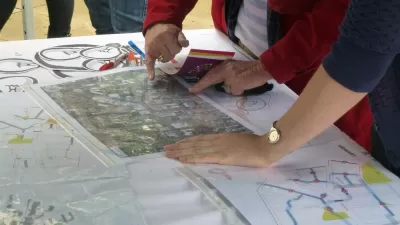Recent studies report a noted decrease in traffic congestion in the D.C. area. Robert McCartney credits two trends and asks how the area should spend additional transportation revenues that will be generated by recent tax increases.
"An unusual confluence of events has created a rare opportunity today for our region to do even more to unclog roads and improve the quality of life," says McCartney.
"Both Virginia and Maryland passed historic tax increases in the spring to raise additional billions of dollars for roads and transit. The new money is arriving just as two important, long-term trends improve the odds that the money could actually lead to appreciably less time wasted in backups."
"First, people are driving less, both in the Washington region and the rest of the nation," he explains. "Second, our area is seeing the benefits of so-called smart growth policies designed to concentrate development around mass transit, especially Metro stations, and generally encourage alternatives to driving."
McCartney looks at the balance of transportation investments that need to be demanded by the public, and some of the key battles that need to be resolved in order to build on recent gains.
"There’s money on the way and reason to believe that it can make a sizable dent in what’s often called the region’s biggest problem. Let’s not blow this chance."
UPDATE: For a critical response to McCartney's column, with suggestions for how to further reduce congestion without building new roads, see Richard Layman's post on the blog "Rebuilding Place in the Urban Space".
FULL STORY: Column: Washington area has a real chance to reduce traffic congestion

Planetizen Federal Action Tracker
A weekly monitor of how Trump’s orders and actions are impacting planners and planning in America.

Map: Where Senate Republicans Want to Sell Your Public Lands
For public land advocates, the Senate Republicans’ proposal to sell millions of acres of public land in the West is “the biggest fight of their careers.”

Restaurant Patios Were a Pandemic Win — Why Were They so Hard to Keep?
Social distancing requirements and changes in travel patterns prompted cities to pilot new uses for street and sidewalk space. Then it got complicated.

Platform Pilsner: Vancouver Transit Agency Releases... a Beer?
TransLink will receive a portion of every sale of the four-pack.

Toronto Weighs Cheaper Transit, Parking Hikes for Major Events
Special event rates would take effect during large festivals, sports games and concerts to ‘discourage driving, manage congestion and free up space for transit.”

Berlin to Consider Car-Free Zone Larger Than Manhattan
The area bound by the 22-mile Ringbahn would still allow 12 uses of a private automobile per year per person, and several other exemptions.
Urban Design for Planners 1: Software Tools
This six-course series explores essential urban design concepts using open source software and equips planners with the tools they need to participate fully in the urban design process.
Planning for Universal Design
Learn the tools for implementing Universal Design in planning regulations.
Heyer Gruel & Associates PA
JM Goldson LLC
Custer County Colorado
City of Camden Redevelopment Agency
City of Astoria
Transportation Research & Education Center (TREC) at Portland State University
Camden Redevelopment Agency
City of Claremont
Municipality of Princeton (NJ)




























